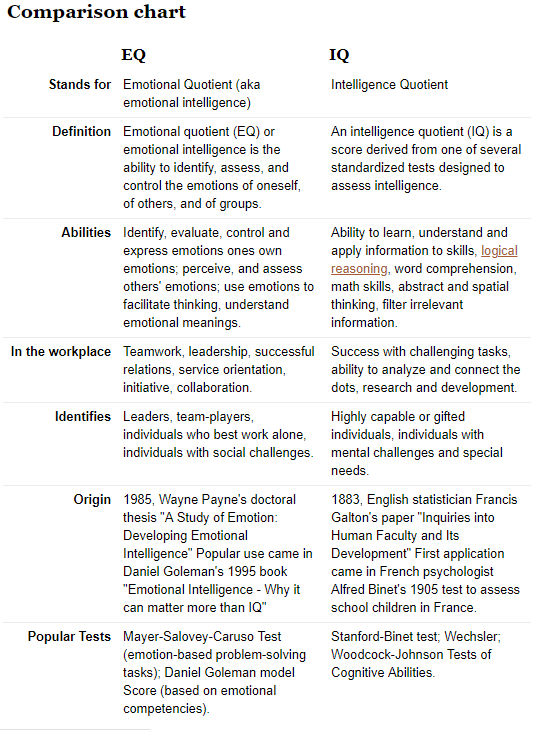EQ vs. IQ
By Bob Gershberg, CEO & Managing Partner, Wray Executive Search For many, emotional intelligence (EQ) is more important than one’s intelligence (IQ) in attaining success in their lives and careers. “Your EQ is the level of your ability to understand other people, what motivates them and how to work cooperatively with them,” says Harvard theorist Howard Gardner. In this global economy, each one of us must develop EQ skills to better understand, empathize and negotiate with other people. In 1999, Psychologist Dr. Carey Cherniss published The Business Case for Emotional Intelligence, which builds a 19-point case for how emotional intelligence contributes to the bottom line in any work organization. Studies suggesting a high EQ is an important quality for business leaders and managers have made it a hot topic in business management. Many companies now mandate emotional intelligence training and utilize EQ tests as part of the hiring process.
What's the Difference Between IQ and EQ?IQ, or intelligence quotient, is a number derived from a standardized assessment designed to test intelligence. IQ covers logical reasoning, word comprehension, and math skills. Emotional Quotient (EQ), also known as Emotional Intelligence (EI) and Emotional Intelligence Quotient (EIQ), is a measure of a person's level of emotional intelligence, or the capacity to be aware of, control, and express one's emotions, and to handle interpersonal relationships judiciously and empathetically. The EQ concept argues that IQ, or conventional intelligence, is too narrow; that there are wider areas of Emotional Intelligence that dictate and enable how successful we are. Success requires more than IQ (Intelligence Quotient), which has tended to be the traditional measure of intelligence, ignoring essential behavioral and character elements.

Understanding the Five Categories of Emotional Intelligence (EQ)
Self-awareness.
Emotional awareness. Your ability to recognize your own emotions and their effects.
Self-confidence. Sureness about your self-worth and capabilities.
Self-regulation.
Self-control. Managing disruptive impulses.
Trustworthiness. Maintaining standards of honesty and integrity.
Conscientiousness. Taking responsibility for your own performance.
Adaptability. Handling change with flexibility.
Innovation. Being open to new ideas.
Motivation.
Achievement drive. Your constant striving to improve or to meet a standard of excellence.
Commitment. Aligning with the goals of the group or organization.
Initiative. Readying yourself to act on opportunities.
Optimism. Pursuing goals persistently despite obstacles and setbacks.
Empathy.
Service orientation. Anticipating, recognizing and meeting clients’ needs.
Developing others. Sensing what others need to progress and bolstering their abilities.
Leveraging diversity. Cultivating opportunities through diverse people.
Political awareness. Reading a group’s emotional currents and power relationships.
Understanding others. Discerning the feelings behind the needs and wants of others.
Social skills.
Influence. Wielding effective persuasion tactics.
Communication. Sending clear messages.
Leadership. Inspiring and guiding groups and people.
Change catalyst. Initiating or managing change.
Conflict management. Understanding, negotiating and resolving disagreements.
Building bonds. Nurturing instrumental relationships.
Collaboration and cooperation. Working with others toward shared goals.
Team capabilities. Creating group synergy in pursuing collective goals. We probably all know someone who lacks “people skills” or are academically brilliant yet are socially and inter-personally inept. We know success does not automatically follow those possessing a high IQ. In today’s highly competitive global economy it makes sense businesses would strive to hire the smartest individuals, however, it has become important to seek those who are equally as thoughtful. The good news is that while some people have EQ as a natural talent, for those that don't, EQ skills can be learned. There has been some clear and focused research that supports people can learn how to interact more effectively at work and increase their emotional intelligence. The book Primal Leadership by Daniel Goleman, Richard Boyatzis and Annie McKee breaks EQ into four domains: self-awareness, self-management, social awareness, and relationship management. Nested within each domain are twelve competencies, learned and learnable capabilities that allow outstanding performance at work or as a leader.
In their Harvard Business Review article, Tomas Chamorro-Premuzic and Adam Yearsley point out The Downsides of Being Very Emotionally Intelligent include lower levels of creativity, difficulty giving and receiving negative feedback, a well-developed ability to manipulate others and an aversion to risk. They summarize that while obsessing over high EQ will create a workforce of emotionally stable, happy, and diplomatic people, but may not drive change and innovation. Although EQ is a valuable skill, it is not the most important factor in long-term success. In summary … Hire high EQ. Hire attitude. Hire well! All the best,
Bob Gershberg | CEO | Managing Partnerbob.gershberg@wraysearch.com(888) 875-9993 ext 102 Finding tomorrow’s leaders today!
.png)
Comments